Stanley Weiser | |
|---|---|
| Born | |
| Nationality | American |
| Alma mater | NYU Film School |
| Occupation | Screenwriter |
Stanley Weiser is an American screenwriter. [1]
Stanley Weiser | |
|---|---|
| Born | |
| Nationality | American |
| Alma mater | NYU Film School |
| Occupation | Screenwriter |
Stanley Weiser is an American screenwriter. [1]
He was born in New York City. His screen credits include Wall Street and W. , both directed by Oliver Stone. [1] He also wrote the 20th Century Fox film, Project X . He is credited for creating characters in the sequel to Wall Street: Wall Street: Money Never Sleeps .
He wrote the screenplay for Project X with Matthew Broderick in 1987. [2] Weiser was Oliver Stone's screenwriting partner on the movie Wall Street , released in 1987 and a cult classic. [3] He also helped Stone write the film W in 2008, about the life of US President George Bush. The dialogue was positively received by Roger Ebert for not containing overtly "revisionist history." [4]
Weiser's other projects include two civil rights dramas, developed as feature films, but made for television. Murder in Mississippi , a chronicle of the 1964 Freedom Summer movement and the lives and deaths of Cheney, Schwerner, and Goodman, the three young civil rights workers who were killed by the Ku Klux Klan, which aired on NBC in 1990. Freedom Song , a semi-fictional account of the early SNCC movement in Mississippi, was co-written with Phil Alden Robinson, who also directed.
Weiser also adapted the novel, Fatherland , by Robert Harris, for HBO. He wrote the NBC four-hour mini-series Witness to the Mob in 1998, which was produced by Robert De Niro.
In 2013, it was reported he'd optioned the novel Three Graves Full and intended to write the script. [5]
He is married and lives in Santa Monica, California. He is a founding member of the West Los Angeles Shambhala Buddhist Meditation Center.
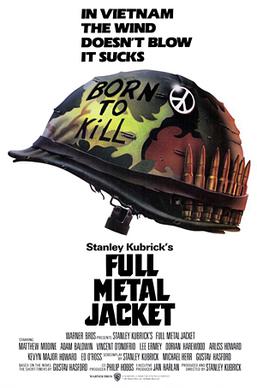
Full Metal Jacket is a 1987 war film directed and produced by Stanley Kubrick from a screenplay he co-wrote with Michael Herr and Gustav Hasford. The film is based on Hasford's 1979 autobiographical novel The Short-Timers. It stars Matthew Modine, R. Lee Ermey, Vincent D'Onofrio, Adam Baldwin, Dorian Harewood, and Arliss Howard.
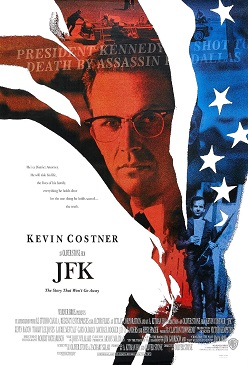
JFK is a 1991 American epic political thriller film written and directed by Oliver Stone. It examines the investigation into the assassination of John F. Kennedy by New Orleans district attorney Jim Garrison, who came to believe there was a conspiracy to assassinate President Kennedy and that Lee Harvey Oswald was a scapegoat.

Roger Joseph Ebert was an American film critic, film historian, journalist, essayist, screenwriter and author. He was the film critic for the Chicago Sun-Times from 1967 until his death in 2013. Ebert was known for his intimate, Midwestern writing style and critical views informed by values of populism and humanism. Writing in a prose style intended to be entertaining and direct, he made sophisticated cinematic and analytical ideas more accessible to non-specialist audiences. Ebert endorsed foreign and independent films he believed would be appreciated by mainstream viewers, championing filmmakers like Werner Herzog, Errol Morris and Spike Lee, as well as Martin Scorsese, whose first published review he wrote. In 1975, Ebert became the first film critic to win the Pulitzer Prize for Criticism. Neil Steinberg of the Chicago Sun-Times said Ebert "was without question the nation's most prominent and influential film critic," and Kenneth Turan of the Los Angeles Times called him "the best-known film critic in America." Per The New York Times, "The force and grace of his opinions propelled film criticism into the mainstream of American culture. Not only did he advise moviegoers about what to see, but also how to think about what they saw."
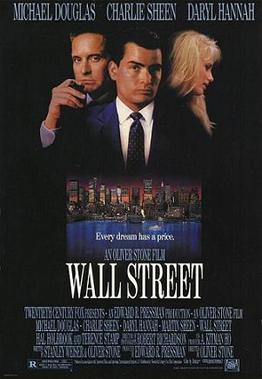
Wall Street is a 1987 American crime drama film, directed and co-written by Oliver Stone, which stars Michael Douglas, Charlie Sheen, Daryl Hannah, and Martin Sheen. The film tells the story of Bud Fox, a young stockbroker who becomes involved with Gordon Gekko (Douglas), a wealthy, unscrupulous corporate raider.

Do the Right Thing is a 1989 American comedy-drama film produced, written and directed by Spike Lee. It stars Lee, Danny Aiello, Ossie Davis, Ruby Dee, Richard Edson, Giancarlo Esposito, Bill Nunn, John Turturro and Samuel L. Jackson and is the feature film debut of Martin Lawrence and Rosie Perez. The story explores a Brooklyn neighborhood's simmering racial tension between its African-American residents and the Italian-American owners of a local pizzeria, culminating in tragedy and violence on a hot summer's day.
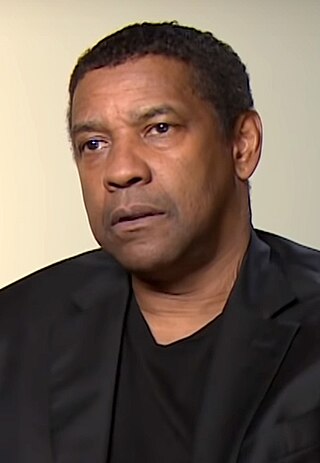
Denzel Hayes Washington Jr. is an American actor, producer, and director. Known for his dramatic roles on stage and screen, he is widely regarded as one of the best actors of his generation, with The New York Times declaring him the greatest actor of the 21st century in 2020. Over his career has received several accolades, including two Academy Awards, three Golden Globe Awards, a Screen Actors Guild Award, and a Tony Award as well as nominations for two Emmy Awards and a Grammy Award. Washington has been honored with the Cecil B. DeMille Award in 2016, AFI Life Achievement Award in 2019, and the Presidential Medal of Freedom in 2022.
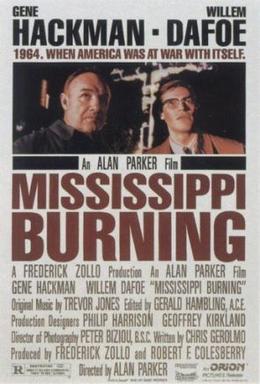
Mississippi Burning is a 1988 American crime thriller film directed by Alan Parker and written by Chris Gerolmo that is loosely based on the 1964 murder investigation of Chaney, Goodman, and Schwerner in Mississippi. It stars Gene Hackman and Willem Dafoe as two FBI agents investigating the disappearance of three civil rights workers in fictional Jessup County, Mississippi, who are met with hostility by the town's residents, local police, and the Ku Klux Klan.
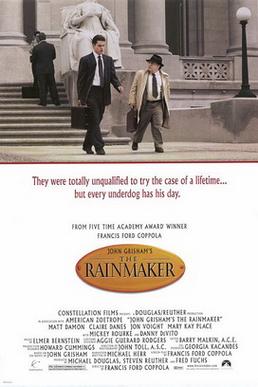
The Rainmaker is a 1997 American legal drama film written and directed by Francis Ford Coppola based on John Grisham's 1995 novel of the same name. It stars Matt Damon, Claire Danes, Jon Voight, Mary Kay Place, Mickey Rourke, Danny DeVito, Danny Glover, Roy Scheider, Virginia Madsen, and Teresa Wright in her final film role.
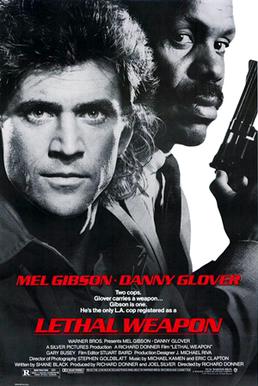
Lethal Weapon is a 1987 American action film directed by Richard Donner and written by Shane Black. It stars Mel Gibson and Danny Glover alongside Gary Busey, Tom Atkins, Darlene Love, and Mitchell Ryan. In Lethal Weapon, a pair of mismatched LAPD detectives—Martin Riggs (Gibson), a former Green Beret who has become suicidal following the death of his wife, and veteran officer and family man Roger Murtaugh (Glover)—work together as partners.

Barry Lee Levinson is an American film director, producer and screenwriter. Levinson won the Academy Award for Best Director for Rain Man (1988). His other best-known works are similarly mid-budget comedy drama and drama films such as Diner (1982), The Natural (1984), Good Morning, Vietnam (1987), Bugsy (1991), and Wag the Dog (1997). In 2021, he co-executive produced the Hulu miniseries Dopesick and directed the first two episodes.

James Edmund Caan was an American actor. He came to prominence playing Sonny Corleone in The Godfather (1972) – a performance that earned him Academy Award and Golden Globe nominations for Best Supporting Actor. He received a motion-picture star on the Hollywood Walk of Fame in 1978.
Rudolph "Rudy" Wurlitzer is an American novelist and screenwriter.
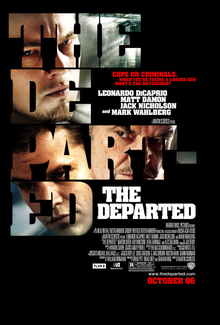
The Departed is a 2006 American epic crime thriller film directed by Martin Scorsese and written by William Monahan. It is both a remake of the 2002 Hong Kong film Infernal Affairs and also loosely based on the real-life Boston Winter Hill Gang; the character Colin Sullivan is based on the corrupt FBI agent John Connolly, while the character Frank Costello is based on Irish-American gangster and crime boss Whitey Bulger. The film stars Leonardo DiCaprio, Matt Damon, Jack Nicholson, and Mark Wahlberg, with Martin Sheen, Ray Winstone, Vera Farmiga, Alec Baldwin, Anthony Anderson and James Badge Dale in supporting roles.

Gordon Gekko is a composite character in the 1987 film Wall Street and its 2010 sequel Wall Street: Money Never Sleeps, both directed by Oliver Stone. Gekko was portrayed in both films by actor Michael Douglas, who won the Academy Award for Best Actor for his performance in the first film. In 2003, the American Film Institute named Gordon Gekko No. 24 on its Top 50 movie villains of all time.

A Time to Kill is a 1996 American legal drama film based on John Grisham's 1989 novel of the same name. Sandra Bullock, Samuel L. Jackson, Matthew McConaughey, and Kevin Spacey star, with Donald and Kiefer Sutherland appearing in supporting roles and Octavia Spencer in her film debut. The film received mixed reviews but was a commercial success, making $152 million worldwide. It is the second of two films based on Grisham's novels directed by Joel Schumacher, with the other being The Client released two years prior.

Cop and a Half is a 1993 American family buddy cop-comedy film directed by Henry Winkler, and stars Burt Reynolds, Norman D. Golden II and Ray Sharkey. Reynolds plays a veteran cop who reluctantly takes an eight-year-old boy (Golden) as his partner to solve a murder investigation.
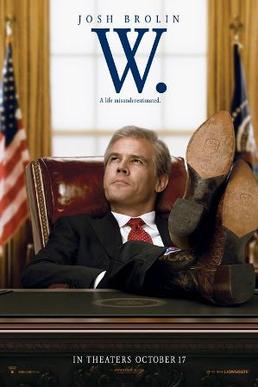
W. is a 2008 American biographical comedy-drama film based on the life of George W. Bush. Directed by Oliver Stone and written by Stanley Weiser, it stars Josh Brolin as Bush. The supporting cast includes Elizabeth Banks, James Cromwell, Ellen Burstyn, Thandiwe Newton, Jeffrey Wright, Scott Glenn, and Richard Dreyfuss. Filming began on May 12, 2008, in Louisiana, and the film was released on October 17, 2008.

Robert Anthony De Niro is an American actor and film producer. He is considered to be one of the greatest and most influential actors of his generation. De Niro is the recipient of various accolades, including two Academy Awards, a Golden Globe Award, the Cecil B. DeMille Award, and a Screen Actors Guild Life Achievement Award. He received the Kennedy Center Honors in 2009, and the Presidential Medal of Freedom from U.S. President Barack Obama in 2016.

Wall Street: Money Never Sleeps is a 2010 American drama film directed by Oliver Stone, a sequel to Wall Street (1987). It stars Michael Douglas, Shia LaBeouf, Josh Brolin, Carey Mulligan, Frank Langella, Susan Sarandon and Eli Wallach.
Mark Swift and Damian Shannon are American screenwriters and film producers. They are known for their collaborative script-writing projects, in particular Freddy vs. Jason and later the 2009 reboot Friday the 13th.